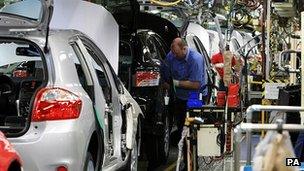British workers 'among worst idlers', suggest Tory MPs
- Published
- comments

Unions say British workers put in some of the longest hours in Europe
British workers are "among the worst idlers in the world", a group of Conservative MPs has claimed.
The UK "rewards laziness", does not encourage risk-taking and must strive to emulate the work ethic and low-tax culture in parts of Asia, the five MPs argue in a book due out next month.
The authors include Elizabeth Truss and Dominic Raab, both tipped to be promoted in a future reshuffle.
"Too many people in Britain prefer a lie-in to hard work," they argue.
The other contributors to Britannia Unchained are Priti Patel, Chris Skidmore and Kwasi Kwarteng, influential members of the "class of 2010" - MPs elected to Parliament at the last election.
Unions described their comments as "ridiculous" and said the most serious challenge facing the economy was a "severe lack of jobs".
'Rewarding laziness'
The MPs' arguments will intensify the debate in the coalition government about how to reverse the slide in the economy, which has seen the UK slip into a double dip recession.
Many Conservatives on the right of the party argue the government's pro-growth initiatives are inadequate and that changes to the labour market, tax cuts and other "supply side" measures needed to boost competitiveness are being held back by the Lib Dems.
The five MPs - who are all members of the Free Enterprise Group of Tory MPs - say the UK needs to reward a culture of "graft, risk and effort" if it is to compete with fast-growing nations.
"Britain will never be as big as China and Brazil but we can look forward to a new generation, ready to get to work," they argue in excerpts of the book published in the Evening Standard., external
"If we are to take advantage of these opportunities, we must get on the side of the responsible, the hardworking and the brave.
"We must stop bailing out the reckless, avoiding all risk and rewarding laziness."
The UK, they argue, is being held back by an excessive public sector, substantial public sector pension liabilities and a welfare system which does not provide sufficient incentives to work.
'Poor productivity'
Most controversially, they suggest "poor productivity" is due in part to attitudes to work in the UK - which they compare unfavourably with countries such as Singapore, South Korea and Hong Kong.
"Once they enter the workplace, the British are among the worst idlers in the world," they write. "We work among the lowest hours, we retire early and our productivity is poor."
Under the EU Working Time Directive, most employees cannot be forced to work more than 48 hours although the UK has an opt-out enabling people to request to work longer if they choose.
The coalition government is currently planning to raise the retirement age for men and women to 67 by 2025, eight years earlier than previously planned.
In contrast, new French president Francois Hollande has said he wants to lower the retirement age from 62 to 60 for some workers.
'Lack of demand'
Unions said the millions of people out of work or working fewer hours than they wanted would find the MPs' arguments "deeply irritating".
"The problem with the UK economy is not its workers, but a severe lack of jobs," said TUC general secretary Brendan Barber.
"It's not the UK work ethic which is holding the country back but a lack of demand in the economy - a situation that is being made considerably worse by government spending cuts.
He added: "Economic success won't come about by turning the screw on British workers, but by investing significantly in jobs, skills and infrastructure for the future."
Ministers say efforts to reduce the deficit and to unlock growth in the economy go hand in hand.
The government has promised further initiatives to boost employment and investment in the autumn on top of recent announcements on housebuilding, broadband and train building.
- Published15 August 2012
- Published15 August 2012
- Published23 May 2012